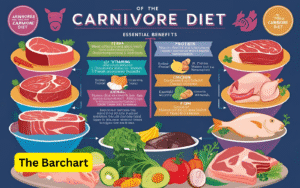The carnivore diet is one of the most controversial and talked-about dietary trends in recent years.
As the name suggests, this diet revolves entirely around consuming animal-based products — including meat, fish, eggs, and certain dairy items — while completely eliminating all plant-based foods.
What makes this diet unique is its strict simplicity: no vegetables, no fruits, no grains, and no processed carbs.
While this might sound extreme, many proponents claim that it offers powerful health benefits, particularly for those suffering from chronic inflammation, autoimmune disorders, digestive issues, and obesity.
This comprehensive guide aims to provide a clear and balanced overview of everything you need to know about the carnivore diet.
We explore its potential benefits, such as weight loss, improved mental clarity, and reduced inflammation.
However, we also address the possible downsides, including nutritional deficiencies, cholesterol concerns, and the lack of long-term scientific research.
Furthermore, the guide dives into how to practically implement the carnivore diet in daily life — including food choices, meal plans, transitioning tips, and how to monitor your health while on this regimen.
Whether you’re curious about trying the carnivore lifestyle or looking to refine your approach, this guide offers the essential knowledge needed to make an informed decision that supports your personal health goals.
Carnivore Diet: An Overview
The carnivore diet is a highly restrictive eating plan that consists exclusively of animal-based foods.
This includes red meat, poultry, fish, eggs, and in some versions, certain dairy products like cheese and butter.
Advocates of the carnivore diet argue that it simplifies eating, eliminates harmful antinutrients found in plants, and allows the body to heal from chronic inflammation and digestive disorders.
Proponents of the carnivore diet suggest that modern humans could benefit from returning to such ancestral eating patterns, particularly in light of the widespread health issues caused by processed and carbohydrate-rich foods.
Ultimately, the carnivore diet challenges mainstream dietary guidelines and offers an alternative path to health based on simplicity and animal-sourced nutrition.
Nutritional Benefits of the Carnivore Diet

The carnivore diet has been reported to deliver several notable health benefits, especially when compared to diets that are high in processed foods or carbohydrates.
One of the most frequently cited benefits is weight loss.
A high intake of protein and fat increases satiety, which can reduce overall calorie consumption and lead to natural weight reduction without the need for strict portion control or calorie counting.
Another commonly reported benefit is improved mental clarity.
Many people claim that removing carbohydrates and sugars helps stabilize blood glucose levels, which in turn reduces brain fog and enhances focus.
This can be especially helpful for individuals dealing with attention disorders, anxiety, or mood swings.
In addition, the diet’s anti-inflammatory effect is significant for some individuals.
By eliminating potential irritants found in plant-based foods — such as lectins, oxalates, and gluten — many people experience relief from chronic joint pain, skin issues, or digestive problems.
The carnivore diet is also incredibly nutrient-dense, especially if it includes organ meats like liver, which is rich in vitamins A, B12, iron, and other essential micronutrients.
Potential Risks and Nutritional Deficiencies
Despite the promising benefits, the carnivore diet carries certain risks and potential drawbacks.
One of the primary concerns is the risk of nutritional deficiencies, particularly if the diet is not varied.
Since plant-based foods are the primary sources of fiber, vitamin C, potassium, and magnesium, their absence can lead to imbalances over time.
Although organ meats can help cover some of these gaps, not everyone consumes them regularly.
Another concern is related to digestive health.
The lack of dietary fiber — crucial for regular bowel movements — can lead to constipation, especially in the early weeks of transitioning to this way of eating.
Over time, the body may adapt, but this can be uncomfortable and concerning for some people.
There’s also a debate around the cardiovascular impact of consuming high amounts of saturated fats.
While some people on the carnivore diet report improved cholesterol profiles, others see an increase in LDL (bad cholesterol), which could elevate the risk of heart disease.
Lastly, long-term data on the safety of the carnivore diet is limited.
Since this is a relatively new trend, its effects over multiple years or decades are still unknown.
Therefore, regular medical supervision and blood work are recommended for anyone attempting this diet seriously and long-term.
Impact on Digestive Health
Digestive health is one of the most controversial aspects of the carnivore diet.
Because it completely Xhamster excludes plant-based fiber, people often worry about issues like constipation or poor gut function.
In many traditional diets, fiber is essential for bulking stool and supporting regular bowel movements.
However, carnivore diet advocates argue that fiber is not as necessary as once thought, and that many digestive issues actually improve when fiber and fermentable carbohydrates are removed.
For individuals suffering from conditions like IBS (Irritable Bowel Syndrome), Crohn’s disease, or bloating, the carnivore diet can sometimes bring noticeable relief.
This is likely because it removes potential gut irritants such as lectins, gluten, and fermentable fibers (FODMAPs) that often trigger flare-ups in sensitive individuals.
Still, others may experience constipation in the early stages of the diet.
This can be mitigated by increasing fat intake, staying well-hydrated, and incorporating bone broth or collagen to aid digestion.
The gut microbiome — the community of bacteria in your intestines — may also change on this diet.
Since plant fibers feed good bacteria, their absence might reduce microbial diversity.
However, the clinical implications of this change are still not fully understood.
Anyone following the carnivore diet should monitor digestive symptoms carefully.
Cardiovascular Health Considerations
Cardiovascular health is a major area of concern when evaluating the carnivore diet, primarily due to the high intake of saturated fats from red meat and organ meats.
Critics argue that diets rich in these fats can increase LDL (bad) cholesterol, a key risk factor for heart disease.
However, the relationship between saturated fat and heart health is complex and still being debated in scientific circles.
Some studies suggest that saturated fat alone does not cause heart disease unless it’s combined with high sugar or processed carbohydrate intake — both of which are eliminated in the carnivore diet.
This has led many proponents to claim that the diet is heart-safe, especially when it helps reduce inflammation, obesity, and high blood pressure — all of which are risk factors for heart disease.
Another point of debate is the absence of fiber and antioxidants in this diet.
These compounds, found in fruits and vegetables, have well-known benefits for cardiovascular health, such as improving cholesterol ratios and reducing oxidative stress. Their exclusion could theoretically pose a long-term risk.
To stay safe, individuals on the carnivore diet should monitor blood markers regularly, including cholesterol levels, triglycerides, and inflammatory markers, and consult their doctor to assess cardiovascular risk based on their unique profile.
Weight Management and Metabolic Effects
One of the primary reasons people turn to the carnivore diet is for weight loss and better metabolic control.
The diet naturally eliminates all carbohydrates, which leads the body to enter a state of ketosis — a metabolic process where fat becomes the main source of fuel instead of glucose.
This shift encourages the body to burn stored fat more efficiently, which often results in rapid weight loss, especially in the first few weeks.
Another major benefit is the high protein intake.
Protein not only helps preserve muscle mass during weight loss but also has a high satiety effect.
People on the carnivore diet tend to feel full for longer periods, reducing the urge to snack or overeat.
Additionally, the absence of processed sugars and refined carbohydrates stabilizes insulin levels, which can significantly improve metabolic health.
For individuals struggling with obesity, insulin resistance, or type 2 diabetes, the carnivore diet may offer a unique therapeutic tool.
Many report improved blood glucose levels, reduced triglycerides, and better energy stability throughout the day.
However, it’s important to recognize that long-term metabolic changes depend on diet quality, individual health status, and how well one adheres to the plan.
Regular monitoring of biomarkers is essential to track progress safely.
Mental Health and Cognitive Function
The carnivore diet is gaining attention not only for physical health but also for its potential impact on mental well-being.
Many people report improvements in mood, focus, and cognitive performance after switching to this meat-based diet.
One possible explanation is the elimination of blood sugar spikes and crashes caused by high-carb or sugar-heavy foods.
When glucose levels are stable, the brain receives a more consistent energy supply, leading to enhanced concentration and reduced “brain fog.”
Additionally, the diet is rich in essential brain-supporting nutrients like vitamin B12, iron, zinc, and omega-3 fatty acids — all of which play a critical role in neurotransmitter function, mood regulation, and cognitive health.
Deficiencies in these nutrients have been linked to depression, anxiety, and memory issues.
Some anecdotal reports even suggest that the carnivore diet may help individuals with more severe mental health conditions, including bipolar disorder, ADHD, and depression.
However, it’s important to note that mental health is complex and influenced by numerous factors, including sleep, genetics, and lifestyle.
Diet alone may not be a cure-all, but for some, removing inflammatory plant compounds and consuming nutrient-dense animal foods provides noticeable mental clarity and emotional stability.
Comparison with Other Diets
When compared with other popular diets — such as keto, paleo, vegan, and Mediterranean — the carnivore diet stands out as the most restrictive.
While ketogenic and paleo diets both emphasize whole foods and low carbohydrates, they still include some plant-based ingredients like nuts, leafy greens, and fruits.
The carnivore diet eliminates these entirely, focusing solely on animal-derived products.
Compared to vegan and vegetarian diets, the carnivore diet is its complete opposite.
Carnivore eaters argue that nutrient bioavailability is superior in meat-based diets, meaning the body can absorb and utilize these nutrients more efficiently.
It’s less restrictive and easier to sustain long-term.
In contrast, the carnivore diet offers faster results for certain individuals but lacks broad scientific validation.
Ultimately, each diet comes with its pros and cons.
The best approach depends on a person’s health goals, ethical beliefs, and how their body responds.
What works for one may not work for another, and personalization remains key to sustainable health.
Environmental and Ethical Considerations

The carnivore diet raises significant questions about sustainability, environmental impact, and animal ethics.
One of the main criticisms is that large-scale meat production contributes to greenhouse gas emissions, deforestation, and water use.
From an ethical standpoint, critics also highlight concerns about animal welfare.
Industrial farming practices, particularly in factory farms, can involve poor treatment of animals, overcrowded living conditions, and the use of hormones and antibiotics.
For those who care deeply about animal rights, the carnivore diet may pose moral dilemmas.
On the other hand, supporters argue that not all meat production is equal.
Regenerative agriculture and pasture-raised livestock can actually improve soil health, support biodiversity, and reduce the carbon footprint when managed responsibly.
They also point out that monocrop farming (used to grow soy, corn, and wheat for plant-based diets) can be equally harmful to the environment due to pesticide use and habitat destruction.
Ultimately, environmental and ethical concerns depend on sourcing.
Choosing high-quality, ethically-raised meat from sustainable farms can reduce the negative impact.
Education, transparency, and conscious consumer choices play an essential role in making the diet more sustainable.
Practical Implementation and Meal Planning Adopting the carnivore diet requires a thoughtful and strategic approach, especially for beginners.
Conclusion
The carnivore diet presents a unique approach to nutrition, with potential benefits and notable risks.
While some individuals may experience positive outcomes, it’s crucial to approach this diet with caution, ensuring that nutritional needs are met and health is monitored regularly.
Personalized guidance from healthcare providers can help navigate the complexities of this dietary choice.



